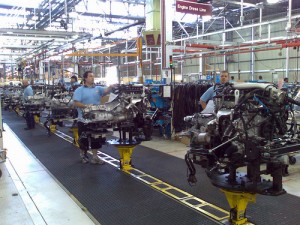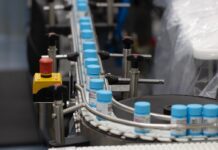The AMWU has devised a strategy to secure the future of the Australian car industry by proposing a string of measures that include funding certainty, Reserve Bank action to lower the dollar, as well as extra taxes on cars from competitor countries to protect the Australian manufacturers.

Image credit: flickr User: HoskingIndustries
The Union’s preliminary submission to the Productivity Commission (PC) inquiry ordered by the Coalition Government has effectively shattered the popular belief that car design and manufacture in Australia was too costly for the taxpayers by world standards.
According to a news release featured on AMWU, the public submission is due to be formally put to the PC inquiry hearings on the industry’s future in Melbourne and Adelaide next week, when the faith of thousands of workers in the sector will be decided.
The data confirmed that Australia is far behind competitor countries it terms of co-investment and its tariffs are the lowest of all major competitors in the car industry.
“We’ll present this to the Productivity Commission, but it’s really the Coalition Cabinet which should be reading it because it must take the decisions on co-investment that car makers need now,” National Vehicles Division secretary Dave Smith said.
“Tony Abbott would bear responsibility for devastation of manufacturing suburbs in Victoria and South Australia, the loss of skills, loss of future technology, the collapse of parts makers and the resulting wide unemployment if Holden or Toyota were to go. No PC report could justify that, he’d go down as the PM who killed the car industry.”
The Productivity Commission will deliver its final report on March 31, even though major manufacturer General Motors is poised to make a decision with regards to its Australian operations by Christmas.
The car industry contributes with $5.4 billion to the economy every year and directly employs over 50,000 workers, on top of the thousands of workers employed in companies reliant upon car manufacturing.
According to the AMWU report, the total Government support per head of population for the Australian car industry is $18, which is much lower than Germany’s $90, Canada’s $96 and America’s $264.
The Government’s support for the car industry has fallen by 16% in the last 6 years, while the support for the mining industry, for example, has risen by 152% during this period.
“There is not a single mass-produced vehicle on the planet which doesn’t benefit from a fair degree of government support but somehow sections of the Australian public have been conned into believing we should be the unique exception,” Dave Smith said.
The AMWU industry strategy calls for bi-partsian policy of setting the Automotive Transformation Scheme finding at $300 million per year, imposing a modest tariff rise to 10% and excise taxes on vehicles from countries such as Thailand, whose protection policies effectively block Australian exports of cars and parts, as well as linking vehicle registration costs to ANCAP safety ratings, with lower rego for high-quality, Australian-made cars.




















